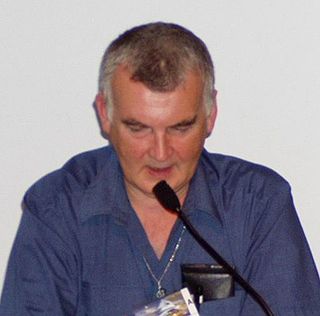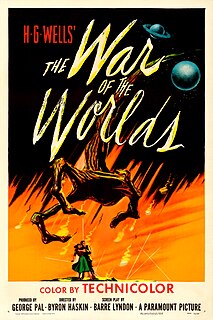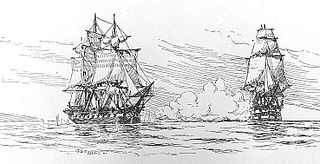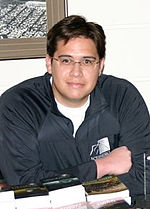
James Patrick Hogan was a British science fiction author.

Kenneth Macrae MacLeod is a Scottish science fiction writer.

Fictional representations of Mars have been popular for over a century. Interest in Mars has been stimulated by the planet's dramatic red color, by early scientific speculations that its surface conditions might be capable of supporting life, and by the possibility that Mars could be colonized by humans in the future. Almost as popular as stories about Mars are stories about Martians engaging in activity away from their home planet.

Science fiction is a genre of speculative fiction that typically deals with imaginative and futuristic concepts such as advanced science and technology, space exploration, time travel, parallel universes, and extraterrestrial life. It has been called the "literature of ideas", and often explores the potential consequences of scientific, social, and technological innovations.
Spy fiction, a genre of literature involving espionage as an important context or plot device, emerged in the early twentieth century, inspired by rivalries and intrigues between the major powers, and the establishment of modern intelligence agencies. It was given new impetus by the development of fascism and communism in the lead-up to World War II, continued to develop during the Cold War, and received a fresh impetus from the emergence of rogue states, international criminal organizations, global terrorist networks, maritime piracy and technological sabotage and espionage as potent threats to Western societies. As a genre, spy fiction is thematically related to the novel of adventure, the thriller and the politico-military thriller.

Stranger in a Strange Land is a 1961 science fiction novel by American author Robert A. Heinlein. It tells the story of Valentine Michael Smith, a human who comes to Earth in early adulthood after being born on the planet Mars and raised by Martians, and explores his interaction with and eventual transformation of Terran culture.

The alien invasion or space invasion is a common feature in science fiction stories and film, in which extraterrestrials invade the Earth either to exterminate and supplant human life, enslave it under an intense state, harvest people for food, steal the planet's resources, or destroy the planet altogether.
Simon Hawke is an American author of mainly science fiction and fantasy novels. He was born Nicholas Valentin Yermakov, but began writing as Simon Hawke in 1984 and later changed his legal name to Hawke. He has also written near future adventure novels under the pen name J. D. Masters and a series of humorous mystery novels. He was the Colorado Writer of the Year, 1992.
Stephen Hunt is a writer best known for a series of fantasy novels with steampunk elements known as the Jackelian series, whose central setting is a nation somewhat resembling Victorian England named the Kingdom of Jackals.

Admiral of the Fleet Edward Hawke, 1st Baron Hawke, KB, PC, of Scarthingwell Hall in the parish of Towton, near Tadcaster, Yorkshire, was a Royal Navy officer. As captain of the third-rate HMS Berwick he took part in the Battle of Toulon in February 1744 during the War of the Austrian Succession. He also captured six ships of a French squadron in the Bay of Biscay in the Second Battle of Cape Finisterre in October 1747.
Kevin Major is a Canadian author who lives in St. John's, Newfoundland and Labrador with his wife. He writes for both young people and adults, including fiction, literary non-fiction, poetry, and plays.

Richard Kingsley Morgan, is a British science fiction and fantasy author.

Joan D. Vinge is an American science fiction author. She is known for such works as her Hugo Award-winning novel The Snow Queen and its sequels, her series about the telepath named Cat, and her Heaven's Chronicles books. She also is the author of The Random House Book of Greek Myths (1999)

James Barron was an officer in the United States Navy. He served in the Quasi-War and the Barbary Wars, during which he commanded a number of famous ships, including USS Essex and USS President. As commander of the frigate USS Chesapeake, he was court-martialed for his actions in 1807, which led to the surrender of his ship to the British. After criticism from some fellow officers, the resulting controversy led Barron to a duel with Stephen Decatur, one of the officers who presided over his court-martial. Suspended from command, he pursued commercial interests in Europe during the War of 1812. Barron finished his naval career on shore duty, becoming the Navy's senior officer in 1839.

Above and Beyond is a four-hour 2006 miniseries aired by the Canadian Broadcasting Corporation on October 29 and 30, 2006. It stars Richard E. Grant, Jonathan Scarfe, Liane Balaban, Allan Hawco, Kenneth Welsh and Jason Priestley. The miniseries deals with the Atlantic Ferry Organization, tasked with ferrying aircraft from North America to Europe in the early years of the Second World War.

Sherlock Holmes's War of the Worlds is a sequel to H. G. Wells's science fiction novel The War of the Worlds, written by Manly Wade Wellman and his son Wade Wellman, and published in 1975. It is a pastiche crossover which combines H. G. Wells's 1897 extraterrestrial invasion story with Sir Arthur Conan Doyle's Sherlock Holmes and Professor Challenger stories. The book is composed of stories originally published in The Magazine of Fantasy & Science Fiction.

The 4732nd Air Defense Group is a discontinued United States Air Force organization. Its last assignment was with the 64th Air Division of Air Defense Command at Goose Air Force Base, Newfoundland, Canada, where it was discontinued in 1960. The group was formed in 1957 when ADC assumed responsibility for air defense of Newfoundland and Northern Canada from Northeast Air Command and controlled a fighter-interceptor squadron at Harmon and seven squadrons operating radars at dispersed locations. It was discontinued when Goose Air Defense Sector assumed responsibility for air defense of Newfoundland and Northern Canada.

The War of the Worlds is a 1953 American science fiction film from Paramount Pictures, produced by George Pal, directed by Byron Haskin, and starring Gene Barry and Ann Robinson.

The Chesapeake–Leopard affair was a naval engagement that occurred off the coast of Norfolk, Virginia, on Monday, June 22, 1807, between the British warship HMS Leopard and the American frigate USS Chesapeake. The crew of Leopard pursued, attacked, and boarded the American frigate, looking for deserters from the Royal Navy. Chesapeake was caught unprepared and after a short battle involving broadsides received from Leopard, the commander of Chesapeake, James Barron, surrendered his vessel to the British. Chesapeake had fired only one shot.

The War of the Worlds is a science fiction novel by English author H. G. Wells, first serialised in 1897 by Pearson's Magazine in the UK and by Cosmopolitan magazine in the US. The novel's first appearance in hardcover was in 1898 from publisher William Heinemann of London. Written between 1895 and 1897, it is one of the earliest stories to detail a conflict between mankind and an extraterrestrial race. The novel is the first-person narrative of both an unnamed protagonist in Surrey and of his younger brother in London as southern England is invaded by Martians. The novel is one of the most commented-on works in the science fiction canon.















